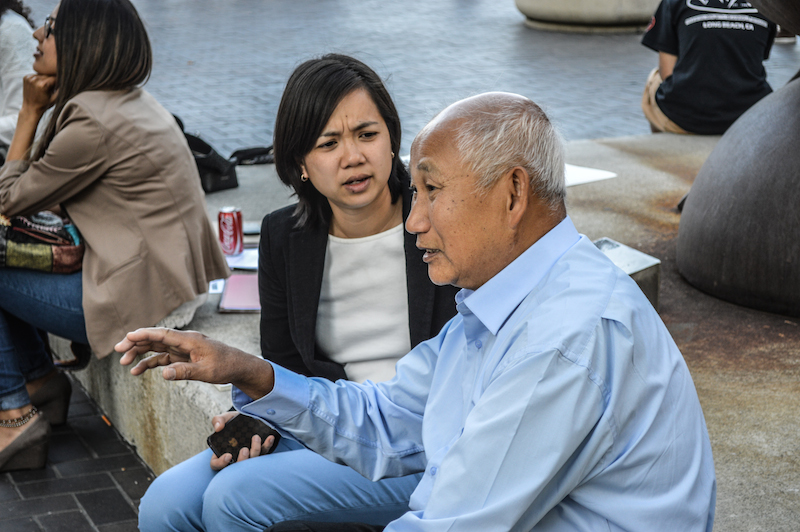
Two Khmer speakers discuss the importance of language access in front of City Hall earlier this year in April. Photo by Brian Addison.
by Alicia Morales | Almost a year ago and in response to community mobilization and collective organizational efforts, the Long Beach City Council passed a Language Access Policy that had been in the making for several years. After much planning, gathering surveys, and inviting the community to participate, we were overjoyed that the policy passed.
Following its passage, the Council directed the City staff to fund it in the Fiscal Year 2014 Budget. A year later, we find ourselves still working to fully implement and fund this policy that the Council promised. A year has passed and this policy has yet to be funded to its fullest extent.
While we have continued to consult with the community, and we have worked with City staff to implement the policy with all its promises, implementation has been difficult. The Language Access Coalition, a collaboration of several organizations—including the Long Beach Immigrant Rights Coalition—has asked the City Council to act on several proposals. These include the translation of vital documents into Spanish, Khmer, and Tagalog; the use of the Language Line Pilot Program; the training of staff on cultural sensitivities of those in our community with limited English proficiency; limiting the use of children as interpreters; and the creation of bi-lingual hiring goals.
The slow pace of the Language Access Policy’s implementation has serious consequences not only for our diverse immigrant community but also for the health and safety of our community as a whole. Official documents for even those who are learning English can be confusing and difficult to understand. Having documents and translation services available for non-native speakers in the key areas of the city not only helps city programs have a broader reach and a more effective impact, but it helps immigrants to assimilate into the social fabric of this diverse city of which we claim to be so proud.
When immigrant parents have to communicate with officials during an emergency, the lives of children and other community members may be at stake. It is in the interest of our community as a whole when immigrant workers and others can easily report hazardous conditions to the proper city agency and when immigrant children do not have to translate in cases of sensitive health and violence issues affecting immigrant adults.
While questions of start-up costs and on-going costs are important, our coalition believes that many of these costs emerge as one-time start-up costs; for example, the translation of vital documents, the set up of the language line, the program to translate voicemails, and the creation of bi-lingual hiring goals.
Our victory in winning a Language Access Policy so far is a bittersweet one. We remain optimistic about the possibility of a fully implemented Language Access Policy in our city. We will continue to push and work with our designated local government officials to implement this policy and ask them to deliver on their promise of accessible government through the full and proper funding of this important policy.
Alicia Morales is the Community Organizer with the Long Beach Immigrant Rights Coalition and has worked with immigrant families and students for seven years. She recently graduated from California State University, Long Beach.
Read more:

